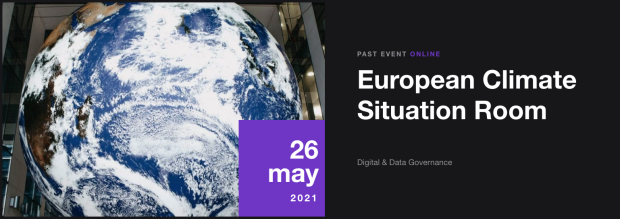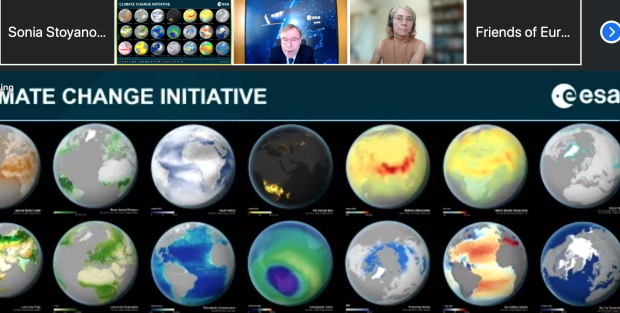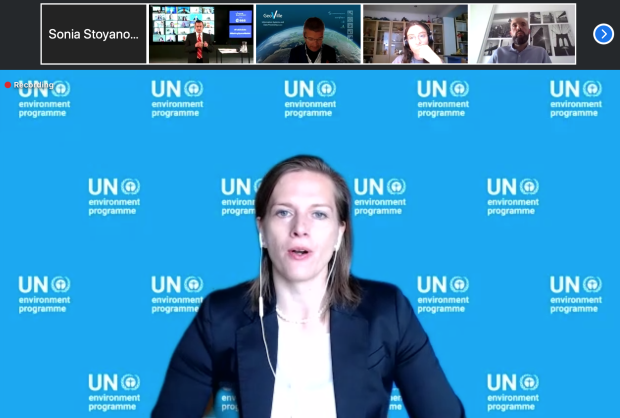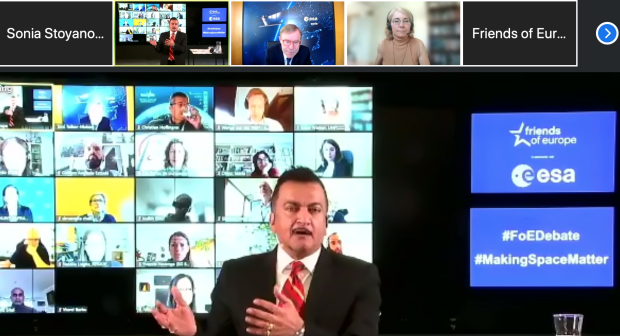The Climate Situation Room: a Friends of Europe event on the use of space date for climate action
Discussion details

The Climate situation room event on 26 May 2021 organised by Friends of Europe, aimed at exploring the role digital and data governance plays for environmental policies.
The event featured a panel of experts, including from the UN Environment Programme (UNEP), who highlighted different ways in which data collected from space could be critical for climate action:
In the description of the event Friends of Europe noted that in 2020 states across the globe strengthened their ambitions towards achieving carbon neutrality and sped up the global green transition. However, while these commitments represented critical steps in the right direction, the world would continue to grapple with the outcomes of the climate emergency for years to come. Foresight would be crucial to mitigate the impacts. In this regard, Friends of Europe made specific reference to UNEP’s World Environment Situation Room which would be an important tool for tracking our progress towards achieving climate neutrality. Supported by EU-provided space data, the World Environment Situation Room is an open and interactive platform that is still in a trial phase, but already boasts numerous partners worldwide.
This article captures in brief the contributions of the different speakers in the panel:
The first speaker Koko Warner, Intergovernmental Panel on Climate Change (IPCC) lead author for the Special Report on Climate Change and Land, emphasised the role of data as a tool that will improve our understanding of the impacts humanity has on the environment and trigger collective behavioural shift in the way we treat nature. She also mentioned that Earth observation and new technologies can help us build trust by enhancing independent verification capabilities.

Second Speaker, Toni Tolker, Acting Director of the European Space Agency’s Earth Observation Programmes and Head of the European Space Research institute, gave a comprehensive overview of EU’s Earth observation capabilities. He underlined that space data allows for a transformation of transparency and verification methods as it provides the tools for grasping the impacts local communities have on the environment but also understanding which communities are the most affected by climate change, thus triggering global responsibility.
Third panellist, Christian Hoffman, owner of the Austria-based company GeoVille Information Systems GmbH, spoke about the ways space data could ensure locally-tailored adaptation approach for the regions that are affected the most by climate change. He also highlighted the importance of availability of space data for businesses and companies in order for them to achieve corporate climate responsibility targets.

Veronika Hunt Šafránková, Head of UNEP Brussels summarised the triple planetary crises we face (Climate change, biodiversity and pollution) and stressed the importance of addressing those in a comprehensive manner. She underlined the ability of the UNEP’s World Environment Situation room to catalase information that could trigger a change in the way we perceive our relationship with nature by showcasing the specific impacts communities around the world have on the environment. Scientific data helps us track and monitor the way we affect our planet and data needs to be integrated into environmental governance in order for us to have evidence-based policy action, Veronika explained.

Finally, Ida Auken, Member of the Danish national Parliament provided thorough insights into the ways decision-makers and policymakers use space data to design environmental policies. She presented examples of the ways the Danish government translated space data into policy instruments and nudges to reduce negative environmental impacts. She also mentioned that data availability has changed the way citizens perceive their individual environmental footprint and this is also reflected in their political expectations: “Visualisartion plays a role in the way we perceive the world and changes our beliefs and actions; visual information plays an important factor for the way citizens hold accountable policy makers” Ida Auken said.
The online event was moderated by Dharmendra Kanani, Director of Asia, Peace, Security and Defence at Friends of Europe as well as Digital and Chief Spokesperson.

Find below:
Link to the event announcement on FoE
Log in with your EU Login account to post or comment on the platform.